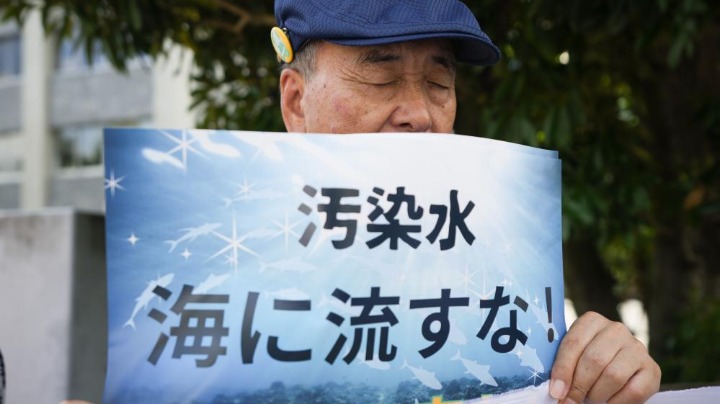Japanese People Gather to Protest Government’s Plan to Dispose of Nuclear-Contaminated Water
Tokyo, August 18th – In a display of solidarity, Japanese citizens gathered in front of the Prime Minister’s residence in Tokyo to demand that the government adhere to its promise of not disposing of nuclear-contaminated water without authorization. The protesters called for the withdrawal of the plan to discharge the contaminated water into the sea and proposed alternatives such as continued storage on land.
Despite the scorching heat and temperatures exceeding 35 degrees Celsius, people from all over Japan gathered in front of the Prime Minister’s official residence. Ryoko Uno, a protester from Kyoto who previously lived in Fukushima City, expressed her concerns about the treatment of nuclear-contaminated water. She emphasized that it is inappropriate for the Japanese government to unilaterally decide to release the water into the sea. Uno pleaded for long-term storage of the contaminated water on land as a viable solution.
Sato Kazuyoshi, a representative of the non-governmental organization “Don’t pollute the ocean again! Citizens’ Meeting,” reminded the government of their agreement with the Federation of Fukushima Prefecture Fisheries Cooperation Associations in 2015. The agreement stated that no disposal of the nuclear-contaminated water would occur without the understanding of relevant parties. Kazuyoshi highlighted that the local fishery in Fukushima has only recovered to approximately 20% of its pre-nuclear accident state. Discharging the contaminated water into the sea would jeopardize the livelihoods of fishermen.
After the rally, the protestors headed to the Members’ Hall of the Japanese Senate to submit a petition to the government and Tokyo Electric Power Company. The petition called for adherence to the 2015 agreement, withdrawal of the plan to discharge the contaminated water, and implementation of measures to prevent the increase of nuclear pollution. Thorough options such as blocking groundwater flow into the nuclear power plant and considering long-term storage or mortar curing were proposed.
Tomoko Abe, a member of the Japanese House of Representatives, emphasized the importance of adhering to principles of non-proliferation and centralized storage of radioactive materials. She questioned the morality of discharging the contaminated water into the ocean, emphasizing that the high seas belong to everyone.
On the previous day, environmental and non-governmental organizations, including Friends of the Earth Japan and the Atomic Energy Information Office, submitted more than 28,000 public signatures to the Ministry of Economy, Trade and Industry of Japan. They requested the government to withdraw the plan to discharge the nuclear-contaminated water into the sea and explore alternatives such as continued land storage.
The petition signatories highlighted that besides tritium, the nuclear-contaminated water also contains various other radioactive substances. The exact total amount of these substances has not been made public, causing concern among fisheries practitioners and individuals both in Japan and abroad. The principle of centralized management of radioactive materials and the possibility of land storage or other alternatives were stressed.
Earlier this year, the Japanese government announced that the discharge of the Fukushima nuclear-contaminated water would occur in “this spring and summer.” Speculations indicate that Prime Minister Fumio Kishida will hold a cabinet meeting to determine the specific discharge date. The discharge is expected to start at the end of this month or in early September.
The government’s handling of the issue has sparked widespread dissent among the Japanese population, who are determined to ensure the preservation of the environment and the livelihoods of local communities. As the pressure mounts, the government faces a critical decision that will shape the nation’s response to the ongoing nuclear contamination crisis.
[Responsible editor: Dong Jing]
